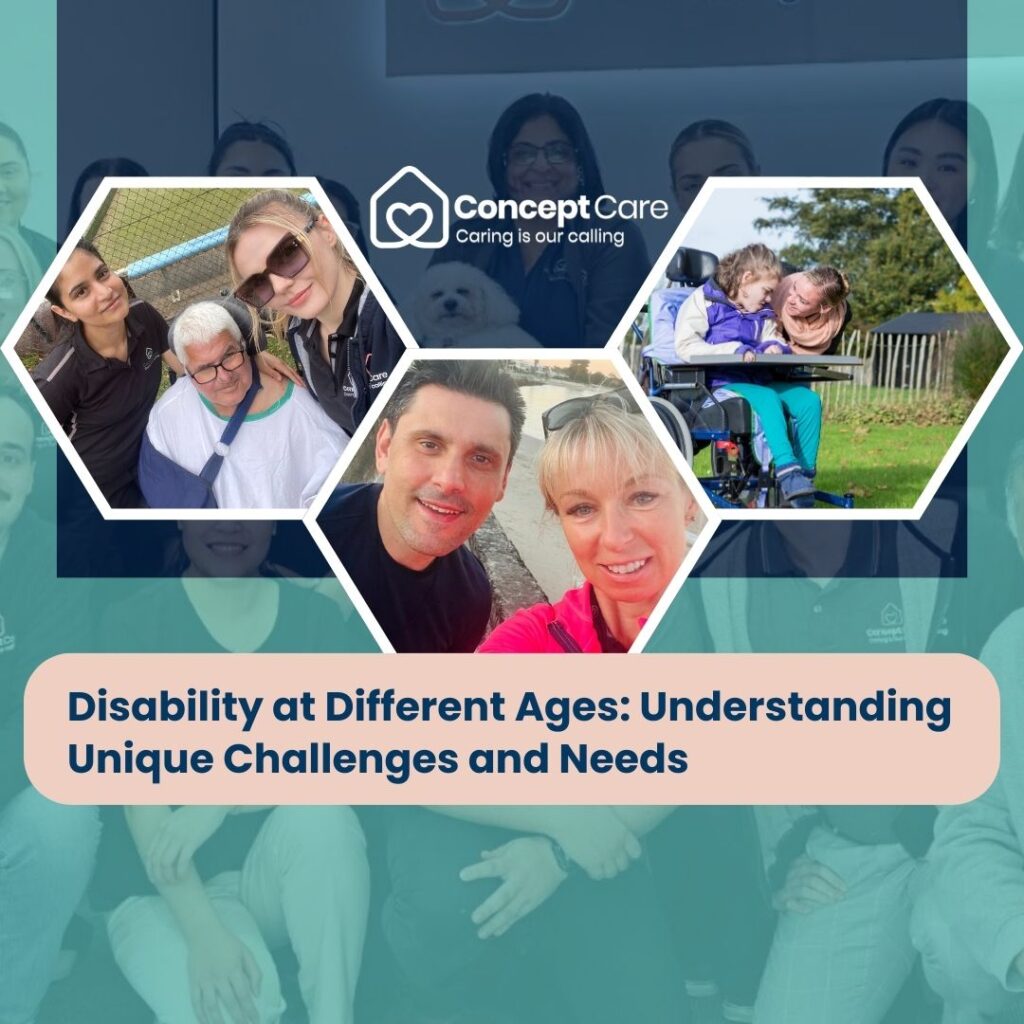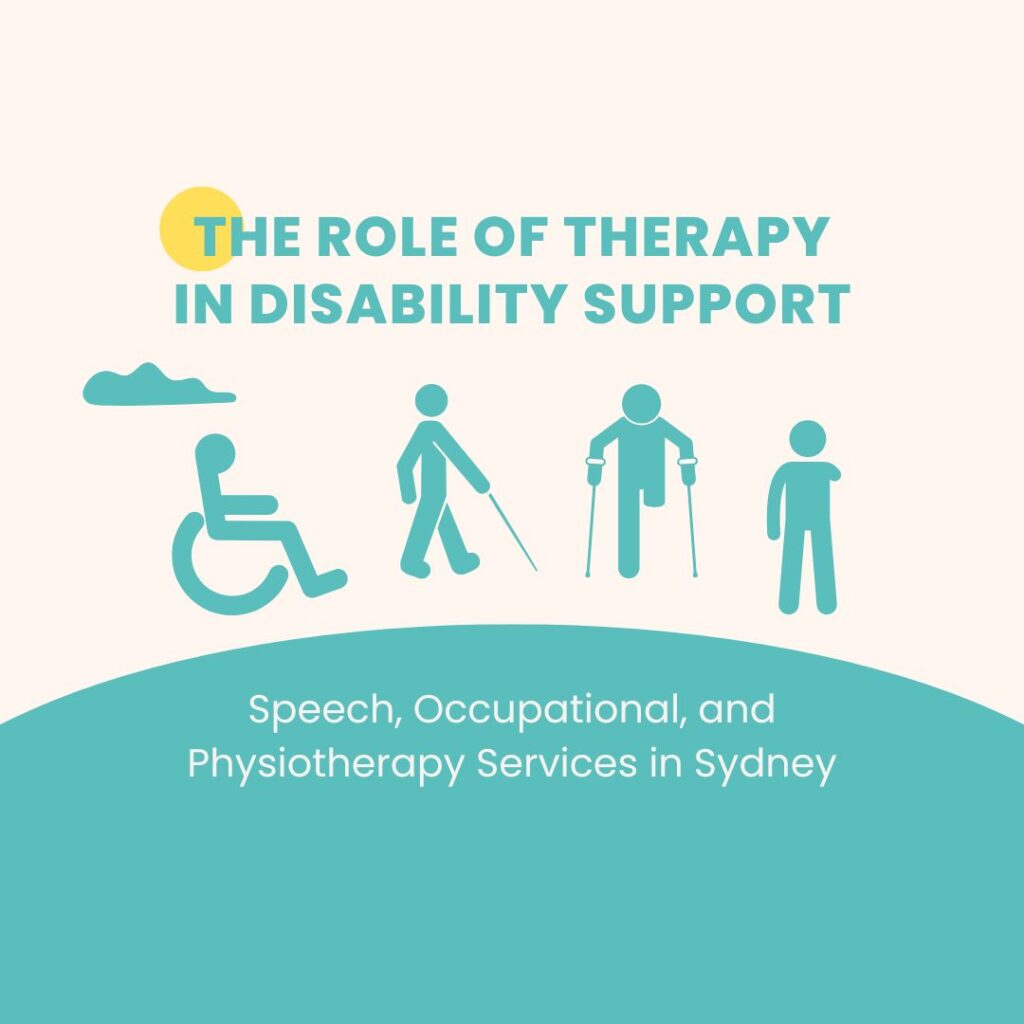Disability at Different Ages: Understanding Unique Challenges and Needs

Disability at Different Ages: Understanding Unique Challenges and Needs Disability at Different Ages: Understanding Unique Challenges and Needs December 24, 2024 Disability can impact individuals differently depending on their age and stage of life. By recognising how disabilities manifest and affect people at various ages, we can better understand their unique challenges and provide tailored support to foster independence and well-being. This blog explores the experiences of individuals with disabilities across different age groups and highlights the importance of age-appropriate care and inclusion. Early Childhood: Laying the Foundation for Growth Disabilities identified in early childhood, such as developmental delays, autism, or cerebral palsy, often influence key milestones like speech, mobility, and social interaction. Early diagnosis and intervention are crucial during this stage to support a child’s growth and potential. Services like speech therapy, occupational therapy, and inclusive education programmes help children build essential skills while fostering confidence and resilience. Parents and caregivers also play a critical role, often serving as advocates to ensure access to necessary resources and support. Creating an inclusive environment at home and in schools can empower children to thrive and reach their full potential. School-Aged Children: Navigating Education and Socialisation For school-aged children, disabilities can impact learning, peer relationships, and participation in extracurricular activities. Conditions such as learning disabilities, ADHD, or physical impairments may require accommodations like specialised teaching methods, assistive technology, or mobility aids. Social inclusion is especially important at this age. Friendships and a sense of belonging are vital for emotional well-being. Schools that embrace inclusive practices—such as adaptive sports programmes and peer support groups—can create environments where all students feel valued and supported. Adolescents: Building Identity and Independence Adolescence is a transformative period marked by self-discovery and increasing independence. For teenagers with disabilities, navigating this phase can present unique challenges, including self-esteem issues, social stigma, or limited access to opportunities. Support during adolescence should focus on fostering self-advocacy and preparing for adulthood. This may include career counselling, mentorship programmes, and skills training to equip young people with the tools they need to succeed. Encouraging peer connections and celebrating achievements can also boost confidence and motivation. Adulthood: Achieving Independence and Inclusion Adults with disabilities often face challenges related to employment, relationships, and community participation. While some individuals achieve significant independence, others may require ongoing support in areas like daily living, transportation, or healthcare. Inclusive workplaces and accessible public services are essential to enabling adults with disabilities to lead fulfilling lives. Advocacy groups and disability service providers, like Concept Care, play a crucial role in empowering individuals by offering tailored support and promoting equality. Older Adults: Managing Health and Accessibility As individuals age, disabilities may emerge or become more pronounced due to conditions like arthritis, vision or hearing loss, or neurological disorders. Older adults with disabilities often face challenges related to mobility, chronic pain, or the need for long-term care. Support for this age group should focus on maintaining quality of life, ensuring access to healthcare, and fostering social connections to combat isolation. Adaptive technologies, home modifications, and community programmes can help older adults remain active and engaged. The Importance of Lifespan Support Disability is a lifelong journey, and the needs of individuals change as they age. By adopting a lifespan approach to care, we can ensure that people with disabilities receive the right support at the right time. This includes: Early intervention for children to maximise developmental potential. Inclusive education and social opportunities for school-aged children. Empowerment and skill-building for adolescents and young adults. Access to employment and independence for adults. Comprehensive care and accessibility for older adults. Building an Inclusive Society Understanding the unique experiences of individuals with disabilities at different ages is key to building an inclusive society. At Concept Care Disability Solutions (Concept Care), one of the trusted NDIS providers in Sydney, we are dedicated to providing personalised, compassionate support that evolves with our clients’ needs. Together, we can create a world where everyone, regardless of age or ability, feels valued, supported, and empowered. What steps can we take to foster inclusion at every stage of life? Share your thoughts with us on LinkedIn.
The Role of Therapy in Disability Support: Speech, Occupational, and Physiotherapy Services in Sydney

The Role of Therapy in Disability Support: Speech, Occupational, and Physiotherapy Services in Sydney The Role of Therapy in Disability Support: Speech, Occupational, and Physiotherapy Services in Sydney December 16, 2024 Therapy plays a vital role in empowering individuals with disabilities to lead more fulfilling and independent lives. Whether it’s improving communication, enhancing motor skills, or addressing physical challenges, therapy services are integral to achieving personal goals and overcoming daily hurdles. In Sydney, a wide range of therapy options, including speech therapy, occupational therapy, and physiotherapy, are available to support individuals with diverse needs. Why Therapy Matters in Disability Support Therapies provide tailored interventions that address specific challenges faced by individuals with disabilities. By focusing on strengths and creating strategies to mitigate difficulties, therapy helps participants: Build confidence and self-esteem. Develop critical life skills. Enhance social interactions and relationships. Improve physical mobility and overall health. Speech Therapy in Sydney: Finding a Voice Speech therapy is essential for individuals facing communication challenges. It supports those with speech disorders, language delays, or difficulties caused by conditions such as autism, cerebral palsy, or Down syndrome. Key Benefits of Speech Therapy: Enhances verbal and non-verbal communication. Supports the development of social and interpersonal skills. Improves swallowing and feeding issues. Where to Find Speech Therapy in Sydney:Sydney offers a variety of speech therapy options, including NDIS-funded programs, private clinics, and community-based services. Speech pathologists work closely with families to create personalised strategies that align with the participant’s goals. Occupational Therapy: Mastering Everyday Life Occupational therapy focuses on helping individuals develop or regain the skills needed for daily living and independence. It’s particularly beneficial for people with disabilities affecting their fine motor skills, sensory processing, or cognitive abilities. How Occupational Therapy Helps: Teaches practical skills like dressing, cooking, and using adaptive equipment. Promotes independence in school, work, or home environments. Addresses sensory integration challenges to improve focus and behaviour. Sydney’s Occupational Therapy Services:From specialized clinics to mobile services, occupational therapy providers in Sydney cater to individuals of all ages. Many therapists work closely with educators and employers to ensure participants succeed across various life domains. Physiotherapy: Enhancing Mobility and Strength Physiotherapy is crucial for individuals with physical disabilities or mobility issues. It focuses on improving movement, reducing pain, and preventing complications associated with limited physical activity. Benefits of Physiotherapy Include: Increased strength, balance, and flexibility. Improved posture and mobility. Prevention of secondary health issues like joint pain or muscle stiffness. Accessing Physiotherapy in Sydney:Physiotherapy services are widely available in Sydney, ranging from NDIS-approved providers to private physiotherapists. Many services also offer home visits, ensuring convenience and accessibility for participants. Therapies Under the NDIS in Sydney The National Disability Insurance Scheme (NDIS) plays a significant role in funding therapy services for eligible participants. With NDIS support, individuals can access customized therapy plans that align with their goals and aspirations. Families and caregivers can collaborate with service providers to ensure the best outcomes. Integrating Therapy into Daily Life Therapies are most effective when integrated into an individual’s routine. Caregivers, families, and therapists can work together to: Practice therapy activities at home. Use adaptive tools and technology to reinforce learning. Encourage consistent participation in social and community activities. How Concept Care Supports Therapy Needs in Sydney At Concept Care, we understand the transformative impact of therapy on individuals with disabilities. Our team collaborates with highly skilled therapists to provide holistic support tailored to each participant’s needs. From accessing funding through the NDIS to finding the right therapy providers in Sydney, we’re here to guide every step of the way. Conclusion Therapies like speech, occupational, and physiotherapy are pillars of disability support, helping individuals achieve independence and improve their quality of life. In Sydney, a wealth of services ensures that participants receive the care they need to thrive. With the right resources and a supportive network, therapy can open the door to endless possibilities. If you or your loved one is seeking therapy services, reach out to Concept Care, a registered NDIS service provider. Together, we’ll create a plan that supports your journey toward a brighter future. Recommended to read: Physiotherapy: The Game-Changer for People with Disabilities

